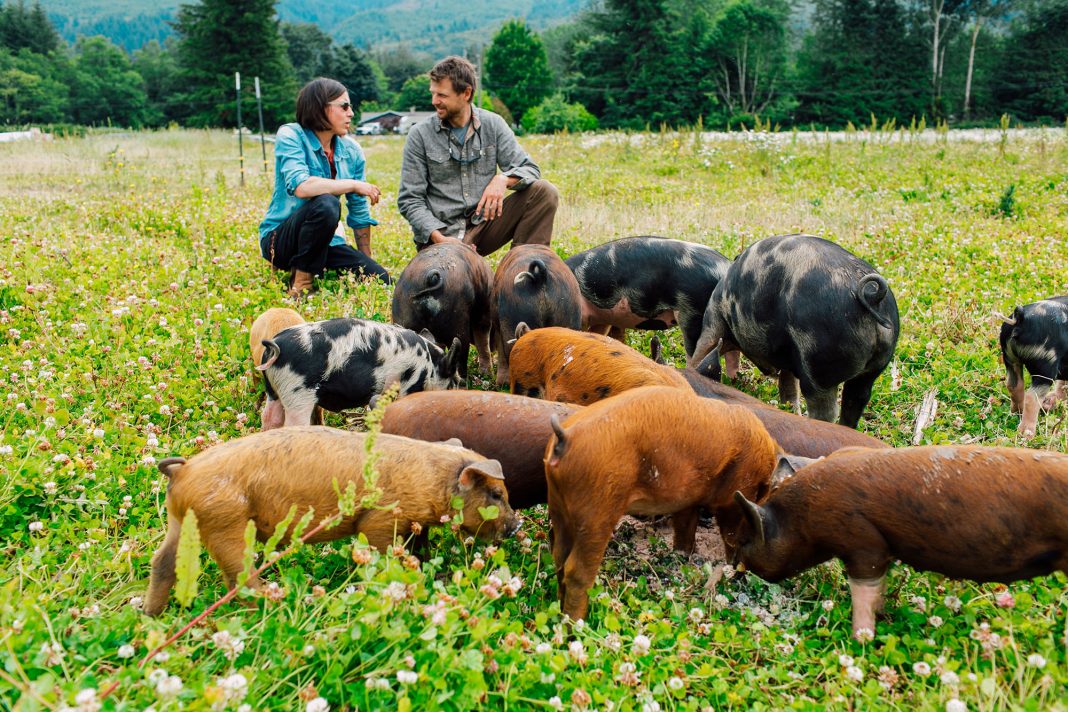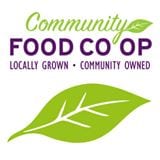Farm animals are a natural staple of farming, whether they’re for milk, eggs, or meat. For local Alluvial Farms and Wild Acres Farm, raising their animals happy and healthy is incredibly important. And both Whatcom farms have their hands full between chickens, pigs and turkeys.
Alluvial Farms and Wild Acres Farm are also supported by the Bellingham Community Food Co-op’s Farm Fund, a program that gives small farmers a monetary boost—and have invested that money into their businesses to help them grow by leaps and bounds.
Alluvial Farms is a small family farm in Everson, owned and managed by Katie Pencke and Matthew McDermott. Together, they have 22 years of farming experience. Their focus is high-quality pastured pork and raising their herds ethically.
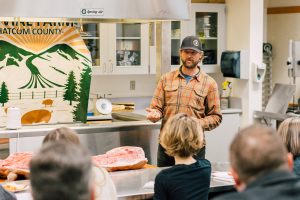
In 2014, McDermott and Pencke studied pastured pork production and went “hog wild” with the idea of heathy animal and crop systems. They launched Alluvial in 2016.
“We saw that there was an opportunity in Western Washington to get more high-quality pastured pork into the marketplace,” says McDermott.
McDermott had worked with a variety of farms and farm systems, including beekeeping in Haiti, before helping to create Alluvial. Pencke is a resource specialist with the Whatcom Conversation District, providing farming and planning services to rural livestock owners. For her, Alluvial is the culmination of a lifelong interest.
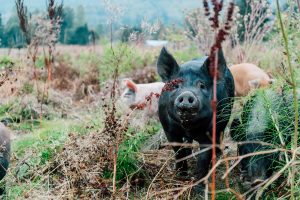
“I like being outside, and I like eating good food,” Pencke says. “It’s a lifestyle.”
Their pigs are well-cared for, and always have access to the outdoors, an airy barn for shelter, and fresh water, food and space. The pigs drink 100 gallons of Jersey cream milk every week, thanks to a partnership with Twin Brook Creamery in Lynden. They also used a Farm Fund secured loan from Industrial Credit Union to buy organic Scratch & Peck pig feed for their first season raising feeder pigs, benefiting both local businesses.
“They’re very curious little creatures and have really neat personalities—they’re super smart,” McDermott says.
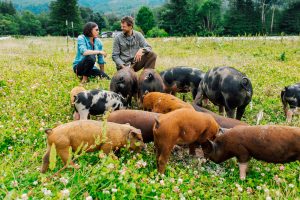
Alluvial Farm has used a Farm Fund loan and Farm Fund Next Step grants to purchase organic feed and complete farm infrastructure projects, allowing them to increase production and sales. This year, Alluvial is growing grains for feed, milling and mixing their own barley and field pea grain rations. McDermott hopes that growing barley will open opportunities to work with breweries, too.
“It [the Farm Fund] has been super helpful,” McDermott says. “Growing a farm business…it’s pretty capital-intensive. So support from community members like the Co-op, that have a pool of funds to help farmers buy new pig feeders or fencing material or whatever it may be to really scale up – that’s huge.”
Alluvial Farm recently acquired their own land, which previously had seemed like a far-off goal.
“It seemed like a big reach for us to acquire our own land,” McDermott says. “And then for it to actually happen, and for all those players to come to the table and support us, that’s really nice to look back on.”
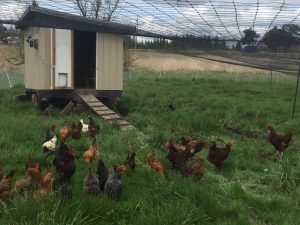
Wild Acres Farm in Bellingham is a family farm dedicated to organic, top quality, pasture-raised meat and eggs.
Owner Brian Rusk ensures his animals – chickens, turkeys and pigs – are raised in small batches. At all times they have access to fresh grass, shelter, protection, and organic, locally produced grain.
“The key thing is really just raising them outside on grass, in their natural environment,” says Rusk, who describes a picturesque, good life for his animals.
Rusk is a relative newcomer to farming, having been through three harvests. He’s also a part-time geology professor at Western Washington University. A few years ago, his family moved out to the county, and he switched his focus to farming.
“It was sort of an abrupt career change,” Rusk admits, but he was driven by a strong desire to raise animals in this way. He wants to see this style of farming become more prevalent.
“I think this is the right way to farm, how farming should be,” he says. “This is the way I express my environmental consciousness, I guess, in a very Bellingham sort of way.”
Last year, Rusk collaborated with the Bellingham Food Bank, which gave him bins of produce waste twice a week for the pigs to eat—effectively turning waste into fuel.
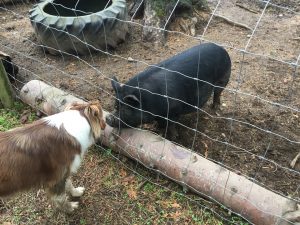
The Farm Fund provided him with a Next Step grant, helping him to buy an egg washer. The washer makes it easier for him to clean eggs, simply feeding them through a conveyer belt. “It’s sort of like a car wash for eggs,” he jokes, and significantly cuts down labor and time.
Rusk recently expanded into aquaponics, a system of growing produce with fish. Fish are raised and fed in a tank, and their food and waste are plumbed through tubes of growing systems. Produce, succulents, and other plants benefit from the fish-based nutrients. Rusk has a 300-gallon tank with over 60 koi in his barn, warmed by LED lights.
While keeping the farm’s focus on animals, Rusk also plans to work with Cascade Cuts, a wholesale plant nursery, using their greenhouses to expand his current 250 square feet of aquaponic growth to over 4,000.
Alluvial Farms products can be found directly from their farm or website, where you can order meat in bulk. They can also be found at Camber Coffee, Twin Sisters Brewery, and the Bellingham Farmers Market on the third Saturday of the month year-round. Alluvial also offers monthly open houses and tours on the second Saturday of the month, from 10:00 a.m. to 3:00 p.m.
Wild Acres Farm products can be found on their farm, at Evolve Chocolate, or at the Barkley Farmers Market on Wednesday afternoons. On May 18, Rusk will also be at the Cascade Cuts Plant Sale with his expanded aquaponics set-up.
Sponsored





























